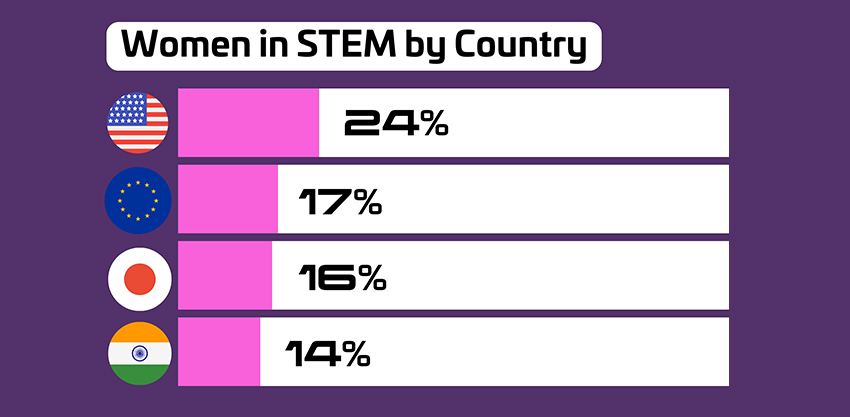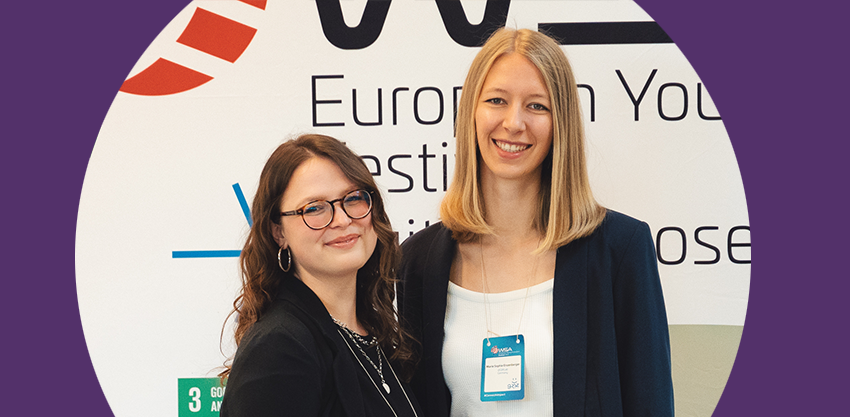Hacking the gender gap in STEM with digital solutions
UN International Day of Women & Girls in Science
Addressing global challenges in the Sustainable Development Agenda requires increased female participation in STEM, bringing diverse perspectives and talent. The UN Day of Women & Girls in Science underscores the crucial role they play and highlights the urgency of enhancing their involvement.

Where are women in STEM?
Despite the widely acknowledged criticality of Science, Technology, Engineering, and Mathematics (STEM) fields for national economies, achieving gender equality within these domains remains a formidable challenge across the global landscape.
According to the UN, the demand for STEM skills in the European labor market is anticipated to nearly triple, soaring from 8% to 23% of the workforce between 2015 and 2025. In contrast, the projected rise in employment within STEM-related sectors is a mere 6.5%. This discrepancy underscores a persistent imbalance.
Even as the Fourth Industrial Revolution propels technological fields forward, a gender gap persists as 28% of engineering graduates and 40% of graduates in computer science and informatics are women. The United Nations warns that women stand to lose five jobs for every one gained through Industry 4.0, compared to the loss of three jobs by men for every one gained.

The Gender Gap - Contributing Factors
Stereotypes: Persistent associations of STEM fields with masculine qualities discourage girls and women from pursuing STEM education and careers.
Lack of role models: The underrepresentation of women in STEM leadership poses a challenge, limiting role models and mentors for aspiring girls and women.
Unconscious bias: Systemic biases in hiring, promotion, and grant funding contribute to the underrepresentation of women in STEM, requiring examination and rectification.
Work-life balance: The demanding nature of STEM careers may lead some women to opt-out or work part-time to manage family responsibilities, impacting career progression.
Hacking the Gap
Encouraging girls in STEM: Initiatives like WSA Winners, GirlBOT and DiGIRLab are increasing girls access to STEM-based education.
Inclusive workplaces: Addressing biases, implementing diversity policies, and offering mentorship foster inclusivity. WSA Winner Laboratoria, is a job-placement platform where tech and IT companies can find female tech talent.
Female role models: Prioritising diversity in hiring is crucial for increasing women's representation in STEM leadership.
Professional development: Training and networking events equip women with skills and confidence in STEM.
Addressing structural barriers: Tackling issues like the gender pay gap is crucial for dismantling structural barriers to gender equity in STEM.
Solutions
In harnessing the opportunities presented by the Fourth Industrial Revolution, a fundamental requirement is a level playing field in terms of access to enablers such as education and information. In 2016, the United Nations’ Human Rights Council affirmed the significance of applying a comprehensive human rights-based approach to expanding access to the internet, considering it a fundamental right.
Closing the gender gap in STEM is a multifaceted challenge requiring a comprehensive approach — from instilling confidence in girls within families to creating incentives for women to join and stay in STEM. Noteworthy projects recognized by the WSA Alumni for their achievements in the UN Sustainable Development Goals are actively addressing the issues faced by women and girls in STEM through innovative digital solutions.
Check out more WSA-awarded digital tools for closing the gap:
ANARIÁ: Bridging Healthcare Gaps for Brazilian Women
SAS Brasil's ANARIÁ leverages mobile gynecological offices and a telemedicine platform to provide free remote consultations and examinations for women in underserved Brazilian cities. Volunteer doctors and nurses remotely conduct telecolposcopy, with the collected material analyzed online. Face-to-face care is reserved for patients with abnormal results, addressing the accessibility challenges associated with cervical cancer in Brazil.
Lean More
DiGIRLab: Nurturing Young Female Coders in the Metaverse
DiGIRLab organizes computer science and digitalization workshops for girls aged 12-21 in a virtual metaverse. Participants learn gamified programming skills, creating computer games or designing 3D objects. The innovative approach enhances engagement, empowering young women to explore and excel in the male dominated world of tech.
Lean More
GIRLBOT Bracelet Maker: Empowering Girls in Tech through Jewelry
GIRLBOT introduces Bracelet Maker, a robotics tool designed to teach girls coding and electronics while creating jewelry. The patented knitting system makes it user-friendly for kids, providing a unique and engaging way for girls to learn and apply STEM concepts through a familiar and enjoyable activity.
Lean More
Laboratoria's Dual Impact: Bridging Tech Talent Gap and Empowering Women
Laboratoria's job-placement platform addresses the global shortage of tech talent, particularly women, by connecting tech companies with trained female professionals. In Latin America, where millions of women face unemployment or low-paying jobs, Laboratoria trains them in front-end web development. This initiative not only provides sought-after female tech talent but also significantly streamlines the recruitment process for companies, reducing time and resources spent. Laboratoria's approach creates a double impact by empowering women economically and meeting the growing demand for skilled tech professionals.
Lean More
Girls Global Ready: Fostering Cross-Cultural Bonds Through Technology
Girls Global Ready employs a curated AI algorithm to connect 200 girls from Eastern Europe and America, facilitating global friendships and cultural exchange. Through virtual pairs, participants engage in monthly challenges, workshops, and virtual panels over 8 months. The most engaged pair earns a transformative prize – an in-person meeting in New York. This initiative not only broadens perspectives but also leverages technology to create meaningful connections and experiences for young girls across continents.
Lean More
Safe YOU: Addressing Gender Based Violence
Girls Global Ready employs a curated AI algorithm to connect 200 girls from Eastern Europe and America, facilitating global friendships and cultural exchange. Through virtual pairs, participants engage in monthly challenges, workshops, and virtual panels over 8 months. The most engaged pair earns a transformative prize – an in-person meeting in New York. This initiative not only broadens perspectives but also leverages technology to create meaningful connections and experiences for young girls across continents.
Lean More

